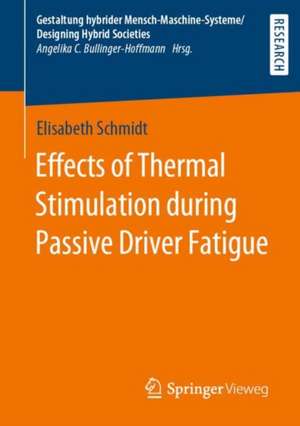Effects of Thermal Stimulation during Passive Driver Fatigue: Gestaltung hybrider Mensch-Maschine-Systeme/Designing Hybrid Societies
Autor Elisabeth Schmidten Limba Engleză Paperback – 13 noi 2019
Preț: 470.90 lei
Preț vechi: 588.63 lei
-20% Nou
Puncte Express: 706
Preț estimativ în valută:
90.11€ • 94.32$ • 74.100£
90.11€ • 94.32$ • 74.100£
Carte tipărită la comandă
Livrare economică 01-15 aprilie
Preluare comenzi: 021 569.72.76
Specificații
ISBN-13: 9783658281571
ISBN-10: 365828157X
Pagini: 230
Ilustrații: XXVII, 230 p. 48 illus.
Dimensiuni: 148 x 210 mm
Greutate: 0.31 kg
Ediția:1st ed. 2020
Editura: Springer Fachmedien Wiesbaden
Colecția Springer Vieweg
Seria Gestaltung hybrider Mensch-Maschine-Systeme/Designing Hybrid Societies
Locul publicării:Wiesbaden, Germany
ISBN-10: 365828157X
Pagini: 230
Ilustrații: XXVII, 230 p. 48 illus.
Dimensiuni: 148 x 210 mm
Greutate: 0.31 kg
Ediția:1st ed. 2020
Editura: Springer Fachmedien Wiesbaden
Colecția Springer Vieweg
Seria Gestaltung hybrider Mensch-Maschine-Systeme/Designing Hybrid Societies
Locul publicării:Wiesbaden, Germany
Cuprins
Fatigue Induction in Simulated Driving.- Effect of Thermal Stimuli on Passive Fatigue.- Detection of Fatigue based on Physiological Measurements.- Driver Vitalization through Fatigue-Based Climate Control.
Notă biografică
Elisabeth Schmidt completed her doctoral dissertation under the supervision of Prof. Dr. Angelika C. Bullinger-Hoffmann at Chemnitz University of Technology, Germany.
Textul de pe ultima copertă
Elisabeth Schmidt investigates the effect of thermal stimulation during passive driver fatigue in a series of driving simulator experiments. Thermal stimulation of the upper body resulted in significantly decreased subjective fatigue ratings as well as an increase in pupil diameter and skin conductance. The effects of different stimulus temperatures, durations, lower leg cooling and repetitive cooling were also examined. The studies show that thermal stimulation of the upper body causes physiological and subjective effects, which can be associated with a short-term sympathetic activation, whereas lower leg cooling does not cause physiological activation.
Contents
Elisabeth Schmidt completed her doctoral dissertation under the supervision of Prof. Dr. Angelika C. Bullinger-Hoffmann at Chemnitz University of Technology, Germany.
Contents
- Fatigue Induction in Simulated Driving
- Effect of Thermal Stimuli on Passive Fatigue
- Detection of Fatigue based on Physiological Measurements
- Driver Vitalization through Fatigue-Based Climate Control
- Researchers in the fields of human factors, ergonomics, user interaction
- Automotive human-machine-interaction specialists
Elisabeth Schmidt completed her doctoral dissertation under the supervision of Prof. Dr. Angelika C. Bullinger-Hoffmann at Chemnitz University of Technology, Germany.
Caracteristici
Contains results of four driving simulator studies





